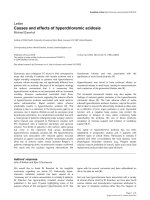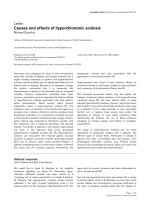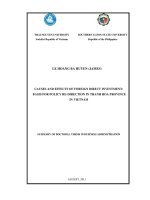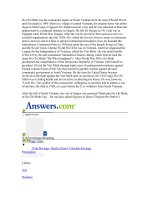CAUSES AND EFFECTS OF WORLD WAR II
Bạn đang xem bản rút gọn của tài liệu. Xem và tải ngay bản đầy đủ của tài liệu tại đây (27.04 KB, 2 trang )
CAUSES AND EFFECTS OF WORLD WAR II
World War II, in terms of casualties and actual material destruction, was the most
devastating war in human history. It cost a lot of countries a lot of money, a lot of
soldiers, and much more. Economies crashed, governments crumbled, and some
would even say that for the countries in the Axis Coalition, that they were in worse
shape after World War II then they were during the Great Depression World War II
left destruction in many countries, but not America! Our economy flourished, there
was prosperity everywhere, we were the richest country, and we were, and still are,
the baddest country out there.
World War II mainly started because Fascist and Communist ideas were starting to
spread like a wildfire, and eventually pushed through into many governments. Hitler
started up the Nazi Party, and they started putting themselves into Germany's
government. The Great Depression left many governments extremely unstable,
especially Germany, where voters were almost forced to turn to Nazi and Communist
ideas, and then Hitler established his dictatorship in Germany.
In the early morning of September 1, 1939, the German forces marched into Poland,
two days later Britain and France caught Hitler by surprise by declaring war on
Germany. Although Britain and France had no plans for helping the Poles, it was still
an even match. Then in 1940, Germany invaded a lot more countries, for example
they invaded Denmark, Norway, Belgium, and the Netherlands. On June 10th of the
same year, Italy declared war on France and Great Britain. France signed a truce
with Germany, and on July 10th the Battle of Britain began. In 1941, they invaded
more countries, one of which was the Soviet Union, who eventually aided the British
forces. In March 1941 the U.S. Congress passed the Lend-Lease Act, which aided
the British, and in September President FDR authorized ships on duty to attack any
Axis warships. During the whole war so far America's relations with Japan had
continued to get worse, and on December 7, 1941, Japanese carrier-based airplanes
struck Pearl Harbor.
June 6, 1944, also known as D-day, Allied armies invaded the beaches of Normandy.
The German resistance was tough, and unfortunately Allied forces were slaughtered
left and right. The counterattack to throw Allied forces off the beach never actually
happened because the forces just kept coming, and fighting for what was right. Our
air superiority made it difficult for Axis Commander Rommel to move their reserves,
but Hitler refused to release his divisions there, and instead, sent for reinforcements.
By the end of June, Eisenhower had 850,000 men and 150,000 vehicles on the
shores of Normandy.
Although Japan's position was hopeless by early 1945, an early end to the war was
not in sight. (Funk and Wagnalls) While the final assault on Japan was waiting on
reinforcements, U.S.forces continued their march, and landed on Iwo Jima, after they
had finally captured it, there had been 6,800 U.S. casualties. The capture of this
island played a very important role in the air war. Its two airfields provided landing
sites for damaged B-295 and enabled fighters to give the bombers cover during their
raids on Japanese cities. (Funk and Wagnalls) On April 1, they landed on Okinawa,
fighting continued until June 21st.









